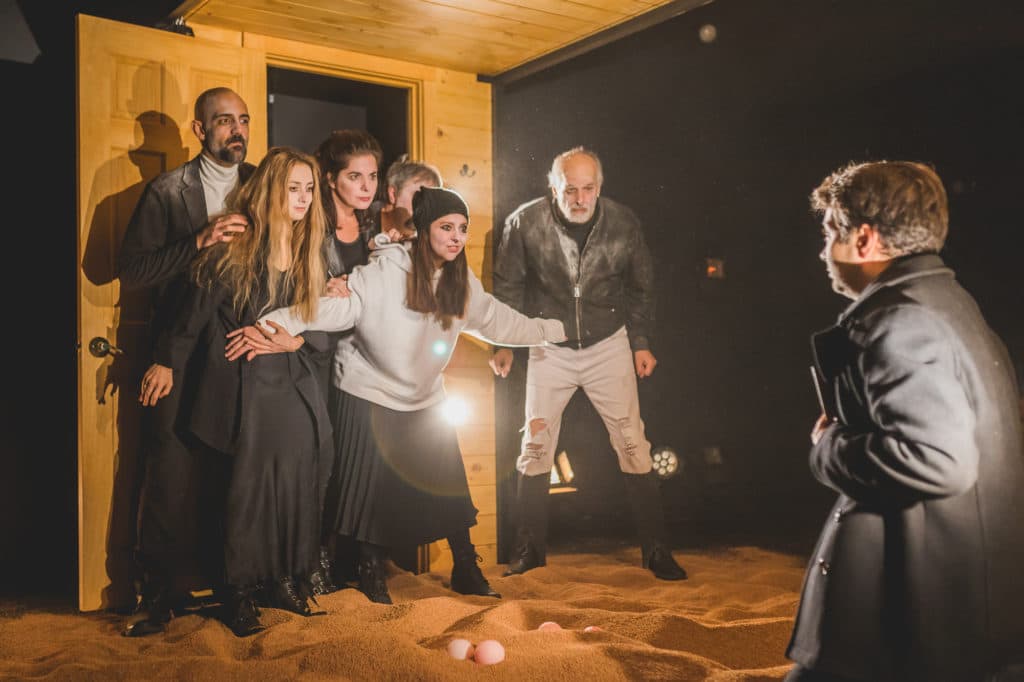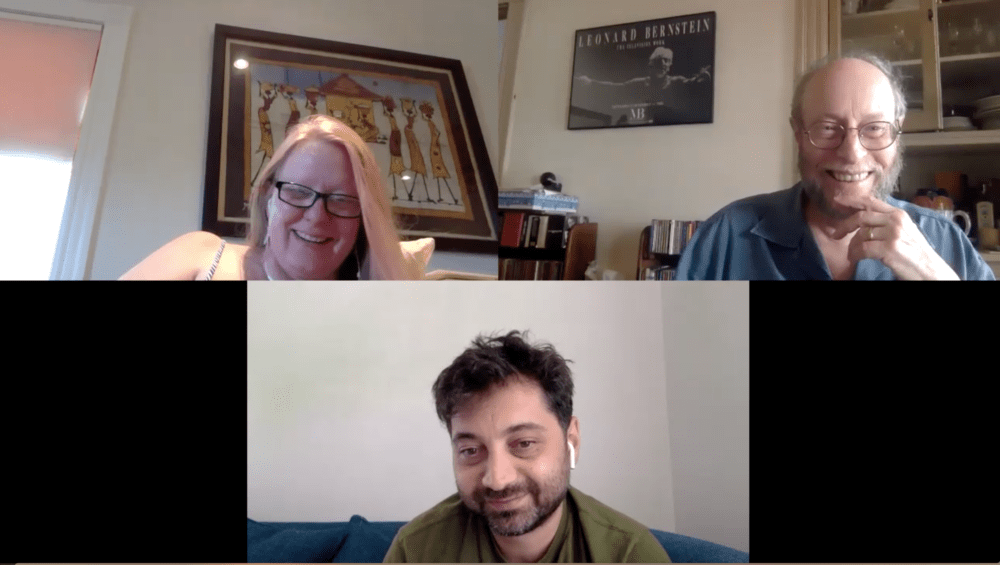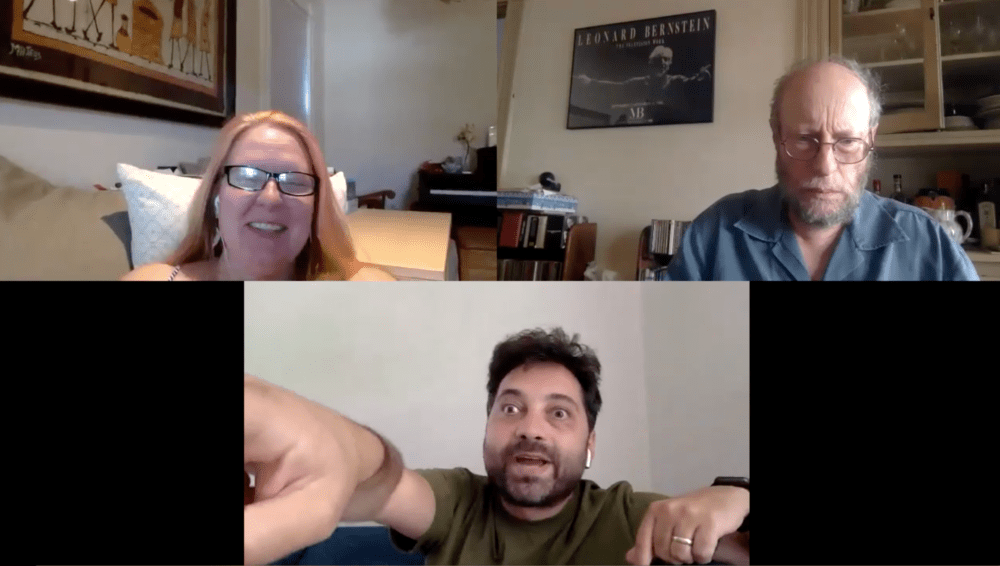Advertisement
The Rise Of The Arlekin Players, From Needham To Zoom

The Arlekin Players Theatre was riding high. Four Elliot Norton awards from the Boston Theater Critics Association for the 2019-20 season, as many as the venerable Huntington Theatre Company and more than most other Boston theater companies. A ton of nominations, to boot, for the small company comprised of Russian and Ukrainian immigrants in Needham. And the company’s multitalented artistic director, Igor Golyak, was about to strut his acclaimed stuff for Actors’ Shakespeare Project audiences directing “The Merchant of Venice.”
Enter the pandemic. No “Merchant.” No gala. The 2020-21 season on hold.
And no theater. For four years, Golyak had turned his part of a rather pedestrian office building into a gathering spot for a former-Soviet émigré community that gobbled up the theater’s seats so quickly that few Bostonians would have been able to attend even if they had known about it. Despite an aesthetic that asked a lot of the audience, they kept coming back for more as Golyak converted the 50-seat space into a place of theatrical enchantment.
The New Repertory Theatre and ArtsEmerson had brought their work to Boston-area theaters, though, and last year Boston theater critics, including me, hot-footed it to Needham on a regular basis — and most were dazzled by what we saw with the Arlekins’ adaptations of "The Stone" and "The Seagull."
But with the pandemic shuttering theaters everywhere and the Arlekins’ finances shaky, particularly after their gala had to be canceled, Golyak decided that they had outgrown the performance space — if indeed it would be possible to reconvene post-pandemic.
What happened next might sound like a movie directed by Frank Capra. Golyak prefers to think of it in terms of a play directed by Konstantin Stanislavski. He had been taught the Stanislavski method as a theater student in Russia, including the adage, he says in a Zoom interview, “The better the actor, the more obstacles they come up with to overcome.”
With no theater to be produced onstage, Golyak turned his attention to online possibilities. That was nothing unique — so did everyone else, often with excellent results.
But there were differences with this one, which didn’t settle for merely Zooming. Golyak reconstituted “State vs. Natasha Banina” from a previous production based on the Yaroslava Pulinovich play, “Natasha’s Dream,” with his partner, Darya Denisova. Denisova, who won a Norton award for “The Stone,” performed live.
In “Natasha,” she stars as a ward of the state in a Russian or Eastern European orphanage, recalling her dream of liberation from a dreary existence through a fantasy love with a journalist though she’s now on trial for a crime that won’t be revealed until the end. It’s a tour de force piece of acting that, like Arlekin’s live theater, asks big questions of the audience about guilt and innocence, collective responsibility and individual freedom, practicality vs. dreaming.
Golyak introduced video effects to the production. And there was an interactive element with the audience serving as the jury for Natasha. She even addressed members of the audience directly, seeing their names in the Zoom boxes. Sara Stackhouse, former chair of theater at the Boston Conservatory at Berklee and an Arlekin adviser, notes that seeing other audience members onscreen is more like the theater experience of watching other audience members in a one-time-only situation and totally unlike a streaming experience that you can watch at any time.
It was such a success that the Arlekins are not only the theatrical toast of the town, but their work is being seen by theater folks around the country and even internationally. “Natasha” is about to “embark” on a virtual tour in conjunction with the Cherry Orchard Festival, beginning with performances co-presented by ArtsEmerson -- Aug. 20 in Russian with English subtitles and Aug. 23 in English. There’ll also be a free conversation between Golyak and Théâtre du Rêve Expérimental’s artistic director Wang Chong Aug. 19.

So who are Golyak and the Arlekin Players? Golyak came to America in 2004 with a background in Russian theater and began working in 2009 with fellow emigres from Russia and Ukraine. Only two had professional acting experience, but they developed an aesthetic that included dance, music, spoken word and performance art. They began performing their adaptation of Chekhov’s “The Bear” at regional, national and international theaters and festivals, including the Moscow Art Theatre School. Golyak, a Ukrainian native, joked that they represented the United States at theater festivals in Russia where they were considered American, whereas in America they are considered Russian.
They finally found a home in Needham in 2016 where they performed mostly in Russian to an audience from former Soviet Union countries. Among the few Bostonians who knew about them were Jim Petosa, then the artistic director of the New Repertory Theatre, and David Dower, his counterpart at ArtsEmerson, who both invited them to perform in their spaces, either in English or with an earphone English translation. Petosa hailed the Arlekins’ “extraordinary vision, bold theatricality and soaring humanity and intelligence” in a recent email.
“Each production is an event, not just of the theater but of the community.”
Igor Golyak
ArtsEmerson imported “Dead Man’s Diary: A Theatrical Novel” in 2018, an adaptation of Mikhail Bulgakov’s unfinished story. Normally the actors, directors and designers in Boston theater all come from the same talent pool and float from one theater to another, their names familiar to theater buffs. Not so with “Dead Man’s Diary.” In addition to director Golyak, it was choreographed by Viktor Plotnikov with a stage design by Nikolay Simonov, an original score by Jakov Jakoulov, and a 14-member cast, none of them a household name in the Boston theater community.
It wasn’t only the names that were unique, it was the sensibility that wedded an often hallucinatory, multidisciplinary presentation with tenacious writing and acting. Reviewing the show for The ARTery, Terry Byrne noted how the production “blends haunting imagery, an evocative soundscape and strange and compelling characters for an evening of mesmerizing theater.”
The production went on to win an Elliot Norton award for design and the following year Boston theater critics followed the Arlekins out to Needham en masse. What we found were outstanding productions of “The Stone” and “The Seagull,” the first a soulful, lapel-grabbing German story of the Holocaust and the lies that people tell themselves and others about heroism and cowardice. You know the second play, or at least you thought you did. What I said at the time: "'The Seagull' [is] a meta-ish piece about a troupe of actors working their way through the wonders of Chekhov. I’ve never felt as close to Chekhov’s psychically-damaged characters — literally, since the performers were almost in my lap, but more importantly, Golyak’s sense of tragedy mixed with comedy melded perfectly with Chekhov."
But it wasn’t just what was happening when the lights went down. The gathering of Russian and Ukranian emigres in the lobby before and after the play seemed like a party, well-stocked bar included. "The Seagull" included well-known guest artists from the Boston Community like Anne Gottlieb and Nael Nacer.
"They really are a family," said Nacer in an email, "and they invite their guests in with open arms. They have all these wonderful traditions that reinforce their connection to one another, and being invited to join them for 'The Seagull' left me feeling enormously grateful and inspired. It's rare to find a community that is both tight knit and welcoming, and they're the real deal. They have so much appreciation for one another and for everyone who comes through their door. There is so much joy in that place, so much dedication, and so much celebration."
More awards. More acclaim. And then the pandemic.
Like many in the theater world, the Arlekins were reduced to experiencing theater on television. Golyak also teaches theater at the Boston Conservatory and his students did a Zoom production of “The Seagull” that he says was much better than the version he staged — which is saying something. “Chekhov would have loved it, I think,” adds Golyak.
When the Boston Theater Marathon, normally one of the primary gathering spots for the local theater community, had to perform its 10-minute plays on Zoom, Golyak was among the viewers.
He started playing around with Zoom himself and thought about the play he brought to the New Rep, “Natasha’s Dream.” But instead of recording a reading or re-creation of “Natasha’s Dream” he recast it as a Zoom performance in which Denisova would perform each show live talking to a jury — the audience.
Again, local critics were enthralled, myself included, though I wondered if those who hadn’t witnessed Golyak’s aesthetic onstage would get it onscreen. The fear was unfounded. New York Times theater critic Maya Phillips wrote, “The Boston-based Arlekin Players Theatre’s digital production of ‘State vs. Natasha Banina’ reimagines the utility of the medium beyond everyday office meetings and virtual happy hours, using graphics, animation and other interactive elements to create a captivating theatrical experience.”
Not quite a theatrical experience. What he came up with was neither theater nor film, Golyak says, but its own artistic idiom. The acclaim made him feel that “people understand my language. And it’s not English. And it’s not Russian. It’s my theater language. It made me feel belonging. I am here and we are here … We immigrants are understood.” Beyond that, “Natasha saved the theater,” says Golyak. Although it streamed for free, there was a button for donations. New Yorkers donated and, true to Boston Brahmin traditions, Bostonians did not for the most part. (Tickets are $25 for the upcoming performances.)
But there were plenty of audience members from New York and elsewhere, like Mikhail Baryshnikov and Jessica Hecht, who posted a promotional video for “Natasha.” Hecht and Golyak are talking about collaborating. There are murmurs of a fall project with Allyn Burrows and Shakespeare & Company in Lenox, who will be presenting "Natasha" Aug. 26 via Zoom and at the Berkshire Drive-In on the S&C grounds in conjunction with the Berkshire International Film Festival.
In that regard, the pandemic was a help. “Baryshnikov would never have come to an Arlekin play,” says Stackhouse and adds with a smile, “but he’s sittin’ at home like the rest of us …” Technical people also tuned in to “Natasha,” some of whom might be interested in working with the company to develop a virtual artistic language. The upcoming virtual tour will give the Arlekins a chance to forge relations with other theaters as well.
Acclaim for "State vs. Natasha Banina" made Igor Golyak feel that “people understand my language. And it’s not English. And it’s not Russian. It’s my theater language. … We immigrants are understood.”
Though the Arlekin aesthetic can be as abstract as that of the pre-Diane Paulus American Repertory Theater, Stackhouse notes that there’s a humanity that’s not overly intellectual in Golyak’s productions. It’s a warmth that makes even the most abstract concepts accessible. “It should make emotional sense to you,” says Golyak.
There’s also a sense of communality that goes beyond the stage. Arlekin and the troupe are family and there’s a certain pride that members of the family take in the performance of “relatives.” Golyak says they’re actually part of a larger community of local emigres, mostly Jewish, who have followed the Arlekins from one space to another. Presuming that the pandemic will some day be over and the troupe finds a larger performing space in Boston, it will be interesting to see how the Russian-Ukrainian community meshes with the Boston theater community. What will happen to their awe-inspiring intimacy if they wind up in a larger theater? Will that same sense of celebration and community follow them to other performance spaces? If so, the theater community could learn a lot from the Arlekins and their audience.
“To tell you the truth, I was so naïve I thought that’s how all theaters have it,” laughs Golyak. “Each production is an event, not just of the theater but of the community.”
And how does Arlekin fit in with the debate about systemic racism in the country as a whole and in the theater as well? That racism “is a point of pain for all Americans, including new Americans,” says Golyak, who adds that they’ve been working with an organization called “Beat the Odds,” a Boston group “serving under-resourced youth in Boston’s low-income communities through its Creative Youth Development Program,” according to the website. They’ve come to talkbacks, says Golyak, that have addressed “how systems fail young people. This is exactly what this organization is working on … We’re beginning to understand that we have to play a part in it and we are playing a part in it, as we can.”
The company is split, says Golyak, on whether the ex-Soviet immigration experience corresponds to the Latinx immigration experience. Stackhouse, who is co-producing the virtual tour, adds that there’s a similar split among funders of theater. The Arlekin troupe is white but, says Stackhouse, their stories of the immigration experience are central to the debate about what’s happening today and they are most certainly an “underrepresented community.” In fact, they note that a Mexican theater is planning to be part of the virtual tour, complete with Spanish subtitles. Several well-known American companies are interested, they say, along with a handful in Russia and Israel.
How long they'll perform "Natasha" remains to be seen, along with where they'll eventually be performing. Today’s times have proved to be an obstacle, but one that has led to even greater invention. Watching the Arlekin Players go from here should be one of the more intriguing — and fun — aspects of theater in Boston, pandemic or post-pandemic.

The Arlekin Players' "State vs. Natasha Banina" is being performed virtually Aug. 20 and 23.





